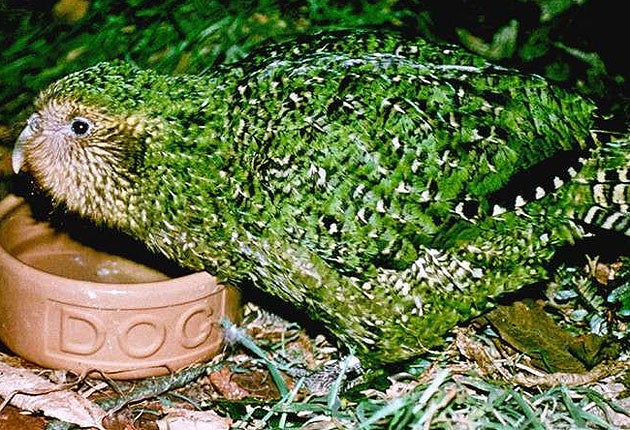World's largest parrot pulled back from the brink
Once facing extinction, the 9lb ground-nesting bird has been rescued by breeding scheme

Scientists in New Zealand have rescued the world’s largest parrot from the brink of extinction. The population of the flightless kakapo has surpassed 100 birds for the first time in decades.
The milestone was reached this month after six chicks hatched on Codfish Island, one of two predator-free islands where kakapo numbers are being restored. There are now 105 birds, more than twice the number in 1999.
The ground-nesting kakapo, which weighs up to 9lb, was once widespread in the forests of New Zealand. But Maoris hunted it for its meat and bright green plumage, and European settlers brought cats, dogs, rats and ferrets into a formerly predator-free environment. A docile bird, the kakapo was prone to freeze on the spot when frightened.
One early explorer, Charles Douglas, wrote in 1899: "They could be caught in the moonlight by simply shaking the tree or bush until they tumbled to the ground … like shaking down apples."
By 1995, there were only 51 individuals left, and the future of the species seemed precarious. But in recent years, the kakapo’s fortunes have been restored. This summer, a total of 14 chicks have hatched on Codfish Island, off southern New Zealand, and all are thriving. Deirdre Vercoe, manager of the Department of Conservation’s kakapo recovery programme, linked the large number of chicks with a bumper crop of the adults’ favourite food: the fruit of the rimu tree. Kakapo are slow breeders, but perk up when they spot large quantities of the seeds. During lean times, conservationists have tried to fool kakapo into believing there was abundant food available.
"We’ve scattered freeze-dried seeds around their nests, even hung them from trees, but they seem to know when it’s the real thing," Ms Vercoe said.
New Zealand’s Conservation Minister, Tim Groser, warned of a "long road ahead" before the kakapo’s future was secure. Every chick is precious, and scientists have used many ways to give young birds the best chance of survival. In the past, adults were fitted with radio transmitters, and infra-red spy cameras were positioned in underground nests, enabling the kakapo to be monitored by volunteers in tents.
Whenever the mother left to forage for food, a bell rang, which was the signal for a volunteer to lower an electric blanket into the nest, using an extendable ski pole, so the eggs could be kept warm. If a predator appeared, the nest-minder would press a panic button, setting off a bang and a puff of smoke to scare it away.
Join our commenting forum
Join thought-provoking conversations, follow other Independent readers and see their replies
Comments
Bookmark popover
Removed from bookmarks